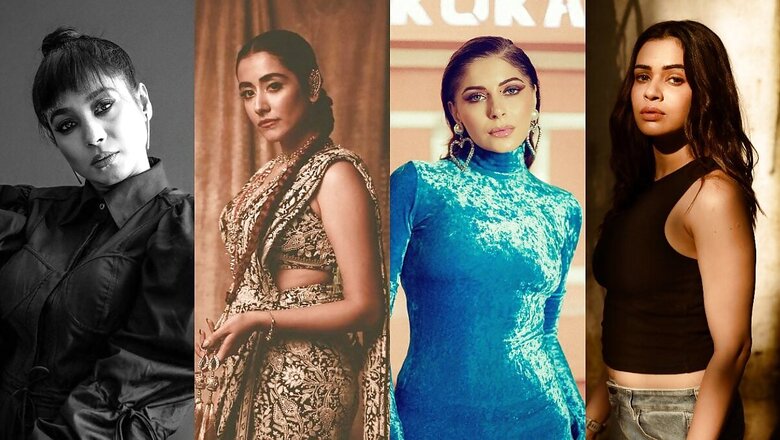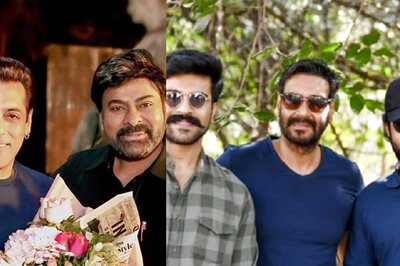
views
A decade ago, Salim Merchant voiced his grudge against how India ‘only has a film industry and no music industry’. And it found resonance in many of his peers over the years. Maybe that’s why Bollywood music has emerged as a genre of its own. Of course, independent music, particularly pop rock, witnessed a major surge in the 90s. At around the same time, a bunch of rock bands like Silk Route, Viva, Euphoria and Indian Ocean began to rule the indie space.
In the 2000s, Hindi film music once again began dominating the scene. Today, our singers and musicians are happily working in an industry where Bollywood music and indie music co-exist. Many of them have made their presence felt overseas too. Case in point: Diljit Dosanjh and AP Dhillon sending fans into a tizzy at Coachella. Others are simultaneously taking to the stage at a global scale. However, the one topic of conversation that cannot be evaded is gender politics and pay disparity between male and female singers in the mainstream space.
As per reports, Arijit Singh is the highest paid Indian male singer. If statistics are to be believed, he gets paid Rs 18-22 lakh per song. The women barring a few are at a relatively lower end of this chain. This World Music Day, News18 Showsha exclusively catches up with some of the most popular and bankable female vocalists, who bat for equal pay and opportunities and dissect the root cause behind the void.
Talking about her experience, Shalmali Kholgade tells us, “I haven’t cared to find out how much my counterparts get paid. I’ve concerned myself only with what I think I deserve. While there are some jobs I put my foot down for the money, I’ve done plenty where I haven’t cared as much for the remuneration but done it for the love of the music. Sometimes I’ve lost the job, but I’ve had no regrets. Sometimes, I’ve gotten my way. Either way, it’s been a win-win.”
Shilpa Rao, on other hand, informs us that she has never had to ‘fight for monetary compensation’ but acknowledges the gap in the pay scale. Stressing on the need for equal opportunities, she says, “I feel it’s gradually improving as the industry has become more aware and progressive. There’s a growing recognition of talent and hard work regardless of gender, and many efforts are being made to ensure more female-led stories are conveyed. This will lead to greater equity and opportunities for all female artists in the music industry.”
Echoing Shilpa’s sentiments, Kanika Kapoor adds, “There’s a gap but things are improving with more awareness and efforts towards equality. Female singers often still face lower pay compared to their male counterparts but it’s all evolving. It’s important to keep pushing for equal opportunities and equal pay for all artists, regardless of gender.”
And has she ever had to ask for what she thinks she rightly deserves? “Yes, it’s important to advocate for fair compensation and ensure that our work is valued appropriately. These experiences have taught me the importance of knowing my worth and not being afraid to assert it,” she remarks.
Jonita Gandhi might be at the top of her game today but she has no qualms in admitting how fighting against the norm has become a regular routine. “This literally happens every day (laughs). Fortunately, I’ve a great team that helps me navigate these situations and fight for what I deserve. I believe it’s worth it to set a precedent and raise your standards even if it means losing a few opportunities. It’s the only way people will understand your worth,” she states.
Sharing her thoughts on why there’s a pay gap between female and male singers, Jonita explains, “There are a lot of metrics that determine paygrade. I do think there are still gaps because male music artists are still bigger than female music artists in India. In the West, that’s not the case. I hope to be part of the change that is already underway and grow the impact of female musicians in India.”
Another conversation that has gained momentum in the last few years is the dearth of Bollywood songs for female singers. Amit Trivedi had once attributed it to the fact that ‘scripts today demand more male-led songs’. And though Shilpa agrees, she quickly points out how ‘a positive shift is paving the way for a more balanced and inclusive musical landscape in films’.
“Usually, the stories told are male-led with male perspectives, hence the songs are also from a male perspective. But I believe that while there have been fewer female-led songs in films, this is gradually changing,” says the Besharam Rang and Chaleya singer, adding that ‘filmmakers and composers are increasingly recognising the power and appeal of female-led songs’.
According to Jonita, however, this dearth is linked to the dearth of women characters in cinema. “Lesser female songs is generally a result of lesser female lead roles in films. The more female-driven stories we tell, the more female-driven music we’ll possibly hear as far as films are concerned,” says the What Jhumka and Deva Deva singer.
Shalmali agrees with Jonita but also believes this dearth stems from the fact that Bollywood has very few female composers. “It’s easier for a male composer to compose in a key comfortable to him and then transpose a few notes up or down. Understanding the female range and then composing for it may be difficult for few composers. When I composed the music for June (an independent Marathi film), I realised it was easier for me to compose for women. A solo male song is also easy, but a duet is the hardest because it needs to suit both the male and female range,” the Pareshaan and Lat Lag Gayee hit-maker elaborates.
Kanika, on the other hand, has a positive perspective on this aspect. While she acknowledges the lack of women-led songs in films, she lauds all those women musicians like herself who’ve become the wind beneath their own wings by taking the indie route. “A lot of women are doing their independent releases, collaboration and shows. There’s a growing recognition for independent music and its versatility that women bring to music,” she asserts.
The ‘Baby Doll’ hitmaker continues, “So yes, women are taking that courageous step of working on their music. This positive trend is not only celebrating talent but also reflecting the changing dynamics within the music industry, paving the way for more female songs in film too.”



















Comments
0 comment